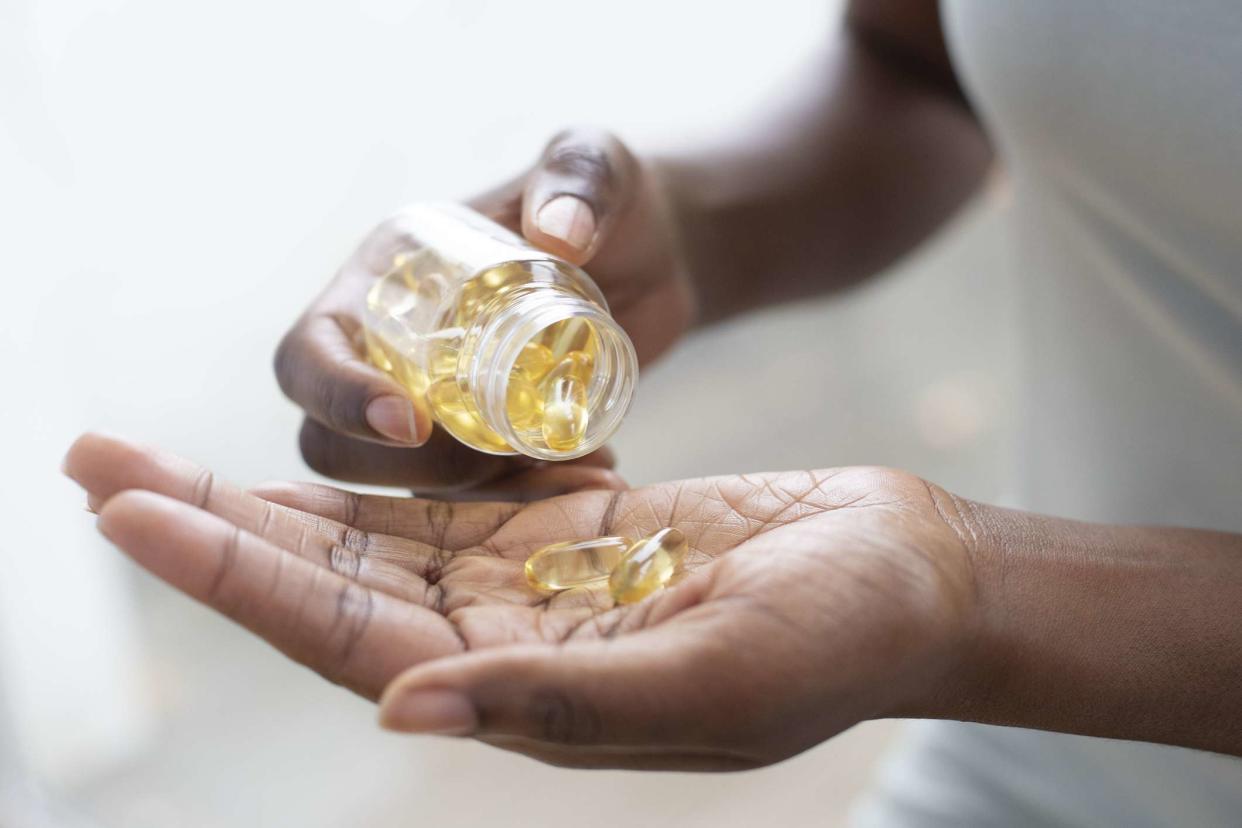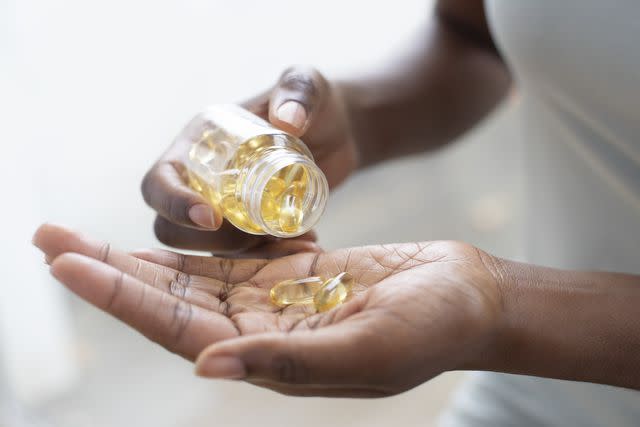Study: Vitamin D Supplements May Help Reduce Risk of Heart Attack in Older People

Getty Images / SCIENCE PHOTO LIBRARY
Fact checked by Sarah Scott
A new study suggests that taking vitamin D supplements may help protect older adults from major cardiovascular events, like heart attacks.
The study is relatively small and researchers and outside medical professionals alike emphasize the need for further research in order to clarify vitamin D's ability to contribute to heart health in this way.
Experts agree that lifestyle factors, like diet and exercise, are still the primary ways individuals can focus on prevention of heart attacks and other cardiovascular-related events.
Taking vitamin D supplements may help reduce the risk of major cardiovascular events (like heart attacks) for older adults, according to a new study.
The trial, which was based out of Australia, assessed 21,315 people who ranged from 60 to 84 years old. They randomly gave one group of 10,662 participants one capsule of 60,000 IU vitamin D, while a placebo was given to 10,653 participants.
The supplements and the placebo were taken orally by participants at the beginning of each month for up to 5 years, with the clinical trial starting in 2014 and concluding in 2020.
Researchers excluded people from the trial with a history of hypercalcemia, or high calcium levels, overactive thyroid, or hyperparathyroidism, kidney stones, osteomalacia, or "soft bones," sarcoidosis, which is an inflammatory disease, or who were already taking more than 500 IU per day of vitamin D supplements.
Study author Rachel Neale, PhD, told Health that there have been plenty of observational studies suggesting that the concentration of 25 hodroxy vitamin D [25(OH)D—the molecule that is measured to determine vitamin D status—in the bloodstream is "inversely associated with health outcomes."
The opposite has been examined less.
While the largest clinical trial of its kind, the researchers acknowledge that the study was relatively small, and more work needs to be done to understand the effectiveness of these kinds of supplements, especially in people who are taking statins or other medications to manage cardiovascular disease.
Neale, who also serves as the deputy coordinator of the Population Health Department at QIMR Berghofer Medical Research Institute, noted that the association between vitamin D and cardiovascular health risk may not be causal.
"Randomized controlled trials are needed to determine whether supplementing people with vitamin D would improve health outcomes," she said.

Getty Images / SCIENCE PHOTO LIBRARY
Taking Vitamin D Supplements Could Protect Your Heart
Over the course of the trial, 1,336 of the participants experienced a major cardiovascular event—this was evenly divided between the placebo and vitamin D supplement groups.
The research team found that 6.6% of those in the placebo group and 6% in the supplement group experienced a cardiovascular event during those five years.
Those in the vitamin D supplement group seemed better protected from these heart disease events; this group experienced a rate of major cardiovascular events that was 9% lower compared to what was seen in the placebo group.
This comes out to about 5.8 fewer cardiovascular events per 1,000 participants. The heart attack and coronary rates were 19% and 11% lower, respectively, in the vitamin D group. That being said, the rate of stroke showed no difference between the placebo and supplement groups.
Related: 26 Symptoms of Low Vitamin D You Need to Know About
How Vitamin D Impacts the Heart
When asked what is known about vitamin D and its impact on heart health, Boback Ziaeian, MD, PhD, an assistant professor of medicine at the David Geffen School of Medicine at UCLA in the Division of Cardiology, told Health that there are many studies out there on vitamin D "that span basic sciences, observational research, and clinical trials."
That being said, it's only very recently that we've started seeing large randomized trials like this one that focus on vitamin D supplements as a mechanism to prevent cardiovascular disease, cancer, and even dementia.
"These trials have all largely been negative for their primary endpoint design. The recent Australian study is the first large study to suggest a possible benefit and that is very uncertain," said Ziaeian, who is unaffiliated with this clinical trial.
Essentially, more needs to be examined here.
Neale said that there are a number of different potential mechanisms inherent in vitamin D that could be beneficial for your heart.
She mentioned that vitamin D "can influence the renin-angiotensin-aldosterone system, which influences blood volume and vascular resistance." She also noted that vitamin D can also lower inflammation and "reduce cardiac remodeling."
"People have hyped Vitamin D for a long time, but blood levels are heavily confounded by other lifestyle factors like how much time someone spends outdoors or not having other chronic diseases," Ziaeian said.
"So, overall, there's no good evidence that supplementing people with vitamin D does anything beneficial for their health unless they cannot produce it, such as patients with severe kidney disease."
What Future Studies Need to Clarify
Ziaeian said that he doesn't believe we will see a future where vitamin D supplementation will be part of a prescription from your doctor.
"Looking at the literature overall, I think it is very unlikely that we would find many benefits for any vitamin supplementation that for vitamins we normally ingest with normal food intake or that our body produces," he said.
Neale said that "uncertainty in the evidence may not ever be completely resolved." She said this leaves medical providers in a "somewhat difficult position" when it comes to prescribing vitamin D supplements, outside of treating vitamin D deficiency.
"I would emphasize that even if our findings do indicate a real effect of vitamin D, it is not a magic bullet," she said. "Diet and exercise will play a much more important role."
Related: 12 Foods That Are Good Sources of Vitamin D
For more Health news, make sure to sign up for our newsletter!
Read the original article on Health.

